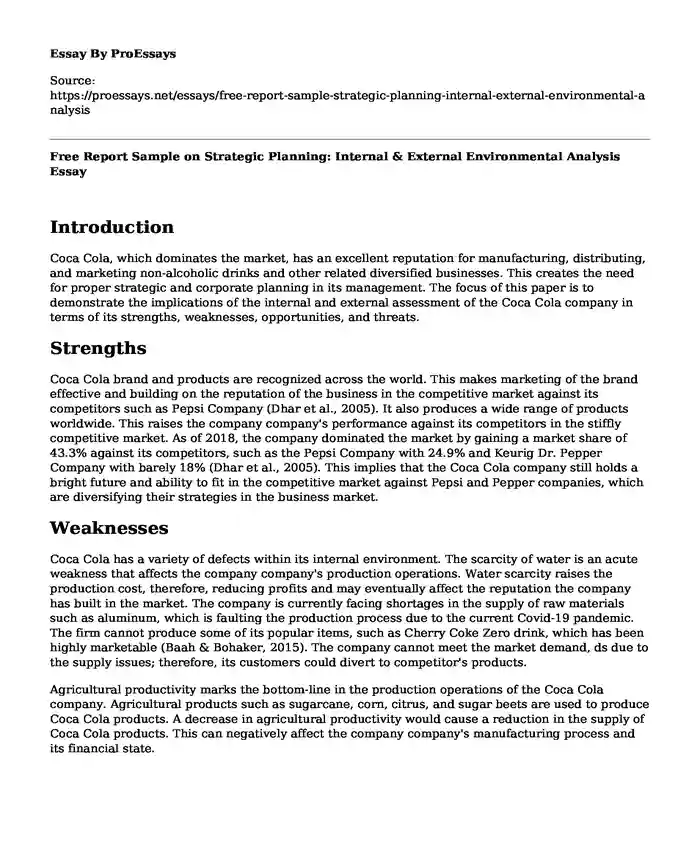Introduction
Coca Cola, which dominates the market, has an excellent reputation for manufacturing, distributing, and marketing non-alcoholic drinks and other related diversified businesses. This creates the need for proper strategic and corporate planning in its management. The focus of this paper is to demonstrate the implications of the internal and external assessment of the Coca Cola company in terms of its strengths, weaknesses, opportunities, and threats.
Strengths
Coca Cola brand and products are recognized across the world. This makes marketing of the brand effective and building on the reputation of the business in the competitive market against its competitors such as Pepsi Company (Dhar et al., 2005). It also produces a wide range of products worldwide. This raises the company company's performance against its competitors in the stiffly competitive market. As of 2018, the company dominated the market by gaining a market share of 43.3% against its competitors, such as the Pepsi Company with 24.9% and Keurig Dr. Pepper Company with barely 18% (Dhar et al., 2005). This implies that the Coca Cola company still holds a bright future and ability to fit in the competitive market against Pepsi and Pepper companies, which are diversifying their strategies in the business market.
Weaknesses
Coca Cola has a variety of defects within its internal environment. The scarcity of water is an acute weakness that affects the company company's production operations. Water scarcity raises the production cost, therefore, reducing profits and may eventually affect the reputation the company has built in the market. The company is currently facing shortages in the supply of raw materials such as aluminum, which is faulting the production process due to the current Covid-19 pandemic. The firm cannot produce some of its popular items, such as Cherry Coke Zero drink, which has been highly marketable (Baah & Bohaker, 2015). The company cannot meet the market demand, ds due to the supply issues; therefore, its customers could divert to competitor's products.
Agricultural productivity marks the bottom-line in the production operations of the Coca Cola company. Agricultural products such as sugarcane, corn, citrus, and sugar beets are used to produce Coca Cola products. A decrease in agricultural productivity would cause a reduction in the supply of Coca Cola products. This can negatively affect the company company's manufacturing process and its financial state.
Opportunities
Coca Cola Company has a strong financial position in the global market, giving it an upper hand in negotiating power for the pricing of raw materials and packaging equipment required in the production process. Having a strong financial position can also help the company acquire other brands and investment opportunities. The company should increase its product diversification due to the slowing demand for carbonated soft drinks in the market to attract consumers who are interested in trying out alternative brands of beverages (Alahi, and Bass,2018). Coca Cola is far behind its beverage, producing competitors; therefore, the company needs to diversify its product lines to attract customers from the rivals.
Threats
Coca Cola company lacks diversification of product lines in its business operations; this gives its competitors like Pepsi a higher chance of beating the company in the beverage market. Pepsi and Snapple have considerable beverage product diversification, making them gain a high market share against Coca Cola. Therefore, the company should make advances to keep up to consumers' market demands through product diversification.
Competitors in the beverage market, such as Pepsi, are aggressive in their marketing strategies by conducting promotions and advertisements. The competitors have put billions in the promotion strategies to boost their product market (ABBASI,2017). This strategy is a threat to the performance of the Coca Cola company and may lead to loss of loyal customers, which may not be recovered quickly. Therefore, the company should identify digital advertisement strategies to boost the promotion of their products against their competitors.
Conclusion
Strategic and corporate planning in an organization requires proper analysis and evaluation of the critical environmental sectors that have a significant impact on the performance of the business. Several internal and external factors influence the company company's strategic decisions in its business environment; therefore, internal and external assessment of the situation is done during planning. Internal and external evaluation involves scanning and evaluating the environmental sectors of an organization to determine the positive and negative changes that would improve the organization's performance. Therefore, a firm should know the changes in its business environment and the competitive market it ventures.
References
ABBASI, H. (2017). Marketing Strategies of Coke: An Overview. Kaav International Journal of Economics, Commerce & Business Management, 4, 194-199.
Alahi, A., & Bass, E. (2018). Coca-Cola's Future Growth Strategy: Diversification?
Baah, S., & Bohaker, L. (2015). The Coca-Cola Company. Culture, 16, 17.
Dhar, T., Chavas, J. P., Cotterill, R. W., & Gould, B. W. (2005). An Econometric Analysis of BrandLevel Strategic Pricing Between CocaCola Company and PepsiCo. Journal of Economics & Management Strategy, 14(4), 905-931.
Cite this page
Free Report Sample on Strategic Planning: Internal & External Environmental Analysis. (2023, Oct 10). Retrieved from https://proessays.net/essays/free-report-sample-strategic-planning-internal-external-environmental-analysis
If you are the original author of this essay and no longer wish to have it published on the ProEssays website, please click below to request its removal:
- Leadership in Energy and Environmental Design Methodologies
- Visual Attention Lab Report Paper Example
- Essay Sample on Amazon and Its Marketing Innovations
- Economic Decision Makers in General Motors Essay Example
- Essay Sample on Positioning and Repsotioning a Product
- Data Analysis and Interpretation of Empirical Findings Paper Example
- Paper Sample on Maximizing Shareholders Wealth: The Benefits of a Good Capital Structure and Financing Strategy







